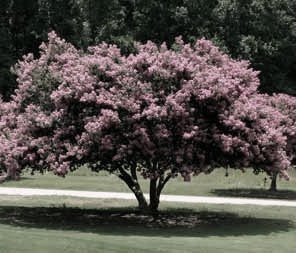TEXAS NURSERY OR PUMPKINS CENTER
The nursery or growing field was five and a half miles northwest of Pottsboro. It was owned and operated by Mr. Kerr. In about 1920 he sold it to C. C. Mayhew. Around 75 people worked on the nursery at one time. They lived in houses and tents in the area around the nursery. They worked ten hours a day and received ten cents an hour. The shop workers would receive fifteen cents. Two of the shop workers, while I was there, were Joe Cook and Jap Roy. They received more because they made all the equipment that the field hands used. Some of the things Joe Cook made were horseshoes from bailing wire, single tree hose, ax hammer handles, and screen doors. About sixteen mules were used on the nursery. Eight were attached to a digger that dug the plants up for shipping. The other eight were used to haul the shrubbery back to the shed for shipping. The nursery's main plants were shrubs, mostly wisteria and crepe myrtle. Every fall the wood was taken off the field plants and hilled in a bed in the field. We would wait until it rained or snowed to cut the wood into small cuttings. These are what were planted to make more shrubbery. Wisteria vines were cut into small cuttings. The root from the wisteria seedlings were cut off and grafted with the cuttings. In the spring these grafts were planted by hand in a row. The women would make funnels of brown paper for the English walnut. When the tree was planted the brown paper would keep the water away from the graft until it callused. Some of the plants were so tender, a shady bed was made with a mesh netting over the plants. Grass and weeds were pulled out of the beds by hand. A small wire fence was put around the field of vanhoot and honeysuckle so the rabbits could not eat bark of the plants. In the winter, when it would snow, the men would wrap their feet in burlap sacks and hunt the rabbits. A large shed was built to prepare the plants for shipping to other places. They were put in bundles called "10-25" for shipping. This meant ten large plants and 25 small plants. The hands got paid once a month and could buy their groceries on the nursery. There was one large cellar at the boss' house. When storms would come up, all the hands would to go the cellar. One large bell stood by the shop or mule barn. It was rung by the shop workers at 12 noon or when the hands were needed. Most of the hands had their milk cows and chickens. They made their own garden and cooked with wood. At different times, they would get together and kill a hog. In 1941, tractors and riding tools were bought to help the work on the nursery. Mr. McGuire's was the nursery's wood cutter. There were 35 of my kinfolks who worked at the Texas Nursery -----Viola Fulenchek Dutton Source : History of Grayson County History, vol. 1 Texas Nursery History Flora & Fauna Elaine Nall Bay ©2013 If you find any of Grayson County TXGenWeb links inoperable, please send me a message. |
